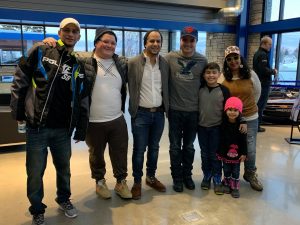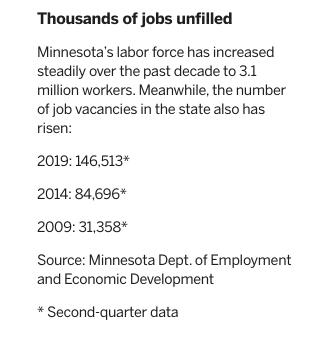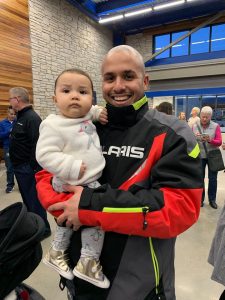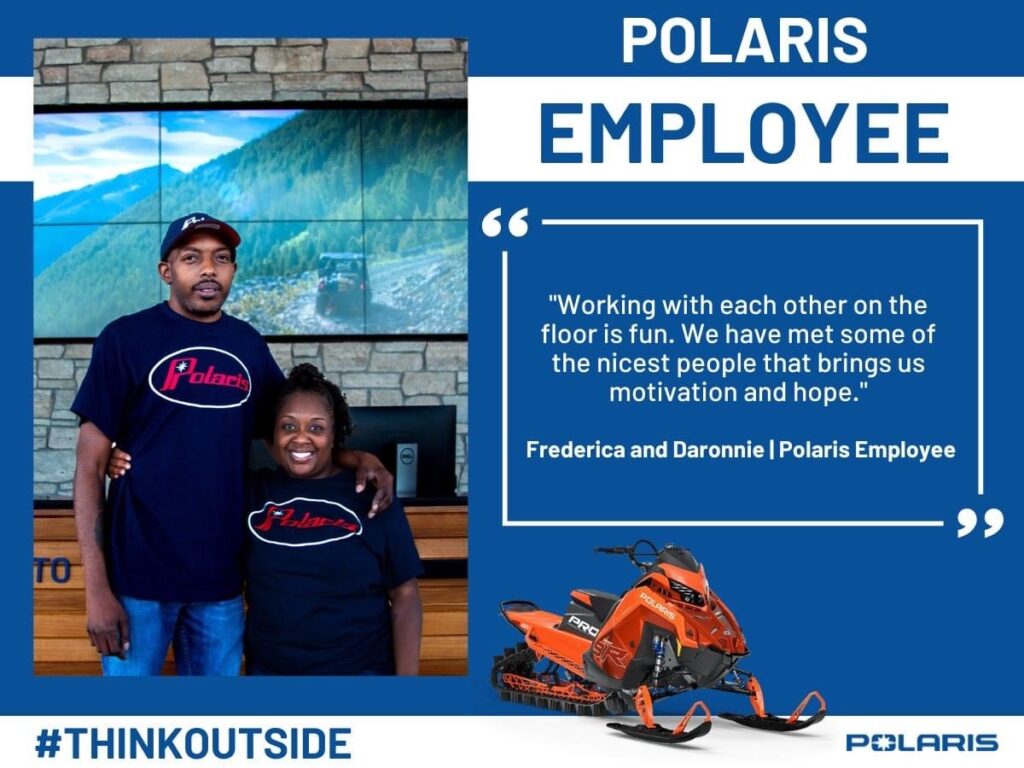Original article from the Star Tribune, March 7, 2020
Ricardo Rojas walked into baggage claim at Minneapolis-St. Paul International Airport last June, spotted his name on a placard, and hopped into a car to head six hours north for a new life.
Five years earlier, he had been a successful network systems engineer for a health insurer in San Juan, Puerto Rico, the mortgage on his $345,000 house was paid off, and his daughter was attending private school. Then he got laid off. With the island’s unemployment rate in double digits most of the past decade, Rojas struggled to find steady work. Then came Hurricane Maria, which devastated the territory. In the aftermath, tens of thousands fled. Rojas’ home value plummeted. Jobs became even more scarce. “The hurricane was like the icing on the cake,” the 55-year-old said.
And so he headed north — way north — to a small Minnesota town 10 miles from Canada and two hours from a Target. Polaris, the Minnesota-based motor-sport manufacturer, wanted workers in a remote part of the state with more jobs than workers.
For Rojas, this was a lifeline: double the pay of a manufacturing job back home, with full benefits, plus a better education for his 14-year-old daughter, who wants to be a doctor. Rojas would be first to arrive here. Twenty-nine more Puerto Ricans and their families would soon follow. In the months since, they have filled the town’s housing — in apartments, in rental houses, in converted church basements — and brought diversity to this generations-long Scandinavian outpost.
It’s a twist on the rural immigration story, and a partial solution to the worker shortage that plagues greater Minnesota. It’s not really immigration at all, since Puerto Ricans are American citizens — but it has all the hallmarks of the shifting demographics and cultural adjustments that have changed small-town America in recent decades.

It’s a massive change for a town of 2,600 people — but one hailed as a positive development for a place needing new energy.
And it’s a counterintuitive tale from an area one resident calls Minnesota’s “tip of the right wing,” where 70% of county voters went for Donald Trump in 2016. Instead of exposing fault lines, the arrival of outsiders illuminated this frigid town’s warm embrace.
“This is a win-win-win for everyone,” said Steve Hoffer, pastor at Roseau Evangelical Covenant Church. “This is a win for Polaris because companies up here in the northwest corner of Minnesota have a hard time finding employees. It’s a win for our community because it helps broaden the overall perspective of our town. There’s a world of people out there with very different experiences than people who have been here their entire lives. And it’s a win for the folks who are moving here, because this is an economic opportunity they simply didn’t have in Puerto Rico.
“We’re playing the long game. We want them to put down roots here, and for this to become home.”
Among the most persistent problems facing greater Minnesota and rural America is a people shortage. Even as Minnesota’s population has risen — it grew by nearly 400,000 since 2010, an increase of 7.5% — rural Minnesota hasn’t shared in the gains.

From 2010 to 2018, the seven-county economic development region in Minnesota’s northwest corner, which includes Roseau, suffered a 1.3% population decline, according to the U.S. Census Bureau. Roseau County has felt that even more acutely, losing population at more than double that rate.
A corresponding decline in workers has affected the manufacturing sector most acutely. The percentage of manufacturing workers 55 and older in Roseau County has more than doubled between 2008 and 2018, meaning almost one in three manufacturing workers here are 55 and older.
And the problem will get worse before it gets better, as baby boomers continue to retire.
“There is no way to find other workers except through migration from other states or immigration from abroad,” said state demographer Susan Brower.
But immigration isn’t the solution it once was. Between July 1, 2016, and June 30, 2017, estimated international net migration to Minnesota was 16,460 people.
Two years later, that number dropped to about 9,000. Last month, Mick Mulvaney, the acting White House chief of staff, told a crowd in England that the United States needs more legal immigration to fuel growth. “We are desperate, desperate for more people,” he said.
“It’s a livelihood story,” said Steve Hine, a research economist for the Minnesota Department of Employment and Economic Development. “There aren’t enough young people being born in Roseau County and staying in Roseau County to meet the needs of an expanding company like Polaris.”
Steve and Mary Hoffer spent three decades in the Twin Cities and raised four children. But when a pastor position opened here in 2014, the Hoffers returned to Mary’s hometown. Her widowed father needed family nearby.
A year ago Polaris hired a Puerto Rican recruiting firm to find a partial solution for a plant that consistently has about 70 job openings — and could add 70 more jobs if it could find the workers.
“A lot of people say this is a Roseau issue,” said Nathan Hanson, the Roseau plant manager. “But drive anywhere in the state of Minnesota, what do you see? ‘Now Hiring’ signs.”

Polaris plans to hire more Puerto Ricans, but the company wants the town’s changes to be incremental. When it brought the idea to Mayor Jeff Pelowski, his reaction was enthusiastic. What’s good for Polaris is good for Roseau, he said.
“It doesn’t matter if you’re from Puerto Rico or Scotland,” he said. “The only racial problems we have here are between Swedes and Norwegians.”
On a recent weeknight, some 150 people crowded into Polaris’ fancy new lobby to celebrate the newcomers. A Puerto Rican made 80 pounds of pork butt. The manager of Roseau’s town ball team recruited Puerto Rican ballplayers. One Puerto Rican couple danced merengue. It was the biggest turnout Roseau’s Civic and Commerce Association has ever had.
Roseau needs people, but residents know it’s a tough sell. But get them here — an outdoorsman’s paradise, with snowmobiling and hockey in winter and world-class walleye fishing in summer — and the mayor believes they’ll stay.
“They look at a map, and they get scared,” Pelowski said. “But once we get people here, they don’t want to go.”
Back in June, Rojas’ car went north from the Minneapolis-St. Paul International Airport — and kept going, and going. “We’re going to the boonies, man!” Rojas said.
It was late when he arrived. The town was quiet. A river ran through downtown. He saw a different world from San Juan: a quaint town with a one-screen movie theater, two fast-food restaurants, and three sheets of ice for hockey.
On a recent afternoon, Rojas sat in a Polaris break room. He’s been promoted to a technician and is making almost $20 an hour.
His daughter will join him come summer and start ninth grade at Roseau Community School. Part of him feels like he betrayed his homeland — more than 500,000 Puerto Ricans have left in the past decade, a nearly 20% drop — but he had to make the best choice for his family.
He’s not certain what his future holds, but he envisions a life here: going into management at Polaris, buying 10 acres near town.
“They told us when they interviewed us: ‘It’s far away. It’s a small town. Are you sure you’re going to be OK?’ ” Rojas said. “Well, we don’t know, but we’re going to find out!”
On a recent morning, Edwin Colón Pérez sat at Reed River Coffee Co. with a Minnesota voter registration application. Pérez and his wife, Karen López Rivera, have never voted in a presidential election.
Even though Puerto Ricans are U.S. citizens, the island is a territory, not a state. Puerto Ricans don’t vote in presidential elections, nor do they have voting representation in Congress.
“The first part is, ‘Are you an American citizen?’ ” said Traci Pederson, an adult basic education teacher who teaches English to Puerto Rican families. “And you check ‘yes.’ ”
Pérez had worked at a medical manufacturing company in Puerto Rico, where he made $10.81 an hour. But production plummeted after the hurricane. Colleagues were laid off. Pérez has two children, 5 and 10, so he jumped at the opportunity to work 12-hour night shifts on Polaris’ manufacturing line, where he bends pipes in tube fabrication. He was excited to live in a place the high school principal describes as “Mayberry in the ’60s.”
“I never heard about Minnesota except for one movie, ‘Fargo,’ ” Pérez laughed. “But I studied this little town. I was living in a little town in Puerto Rico. I saw there was very low crime here. This winter people say has been very easy. That’s been nice for us. But we’ll see about next winter!”
The Puerto Ricans are affecting the community in other ways. They work at the AmericInn and at the bakery at Super One Foods. One Polaris employee hopes to open a restaurant featuring island specialties like mofongo and alcapurria. The wife of another hopes to start a school dance team. They worship at churches and drink beers at Legends Sports Pub and Grill. At a high school lip-sync competition, a new student rapped in Spanish a song he’d written. The 500 students erupted in applause.
Hiram Díaz moved here in October, followed by his wife, Mayra Soto, and their three kids. They’d owned an upscale interior design business in Puerto Rico. After the hurricane, people were looking to rebuild, not redecorate. The business closed.
When Mayra moved here, she was enthralled by the snow and filled her phone with pictures of snowflakes. She’s learning the slower pace.
“Hiram told me, ‘Shhh, Mayra, relaaaax — you’re in Roseau,’ ” she said with a laugh. “I’m enchanted. Roseau is beautiful. I think it’s like a movie.”
Pérez arrived in August, and was joined by his wife and children in October. The family misses Puerto Rico. New Year’s Eve was strange — so quiet compared to home — and Jan. 6, when Puerto Rico raucously celebrates Three Kings Day, passed without notice.
When Karen López Rivera started talking about the island — the music and the food, the rivers and the mountains — she started to cry. The family may go back someday. “But that day is not now,” Pérez said.
They’ve been snowshoeing and sledding. The kids made snowmen for the first time. They drove to Bemidji to see Paul Bunyan and Babe the Blue Ox. They put a winter survival kit in their car. They don’t know what the future will hold. They have two separate dreams: to move back to Puerto Rico and open a tourism business. Or to stay here.
“This is my dream,” Pérez said. “The reality is that I need money. I see this time like an adventure. I never thought I would move to the north. So now I want to travel here, and I want to work very hard for my kids.”
Article Credit: Star Tribune.


